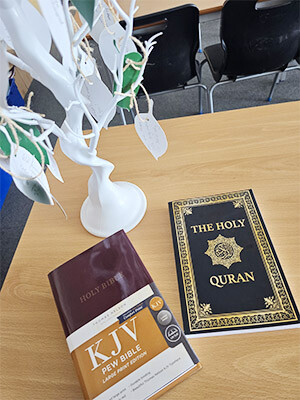Eastbrook School to Offer GCSE Religious Studies Option
Starting in September, Eastbrook School will be offering Religious Studies as an option for GCSE students. This exciting development provides students with the opportunity to explore the complexities of religion and its impact on individuals and society.
The school will be following the Eduqas GCSE Religious Studies specification, which is designed to promote a deeper understanding of religious beliefs, values, and practices. The course covers a range of topics, including:
- Component 1: Study of Religions: Students will study two religions in depth, exploring their beliefs, practices, and sources of authority. The two religions studied will be:
- Christianity
- Islam
- Component 2: Thematic Studies: Students will explore four thematic topics, including:
- Relationships and families
- Human rights and social justice
- Issues of life and death
- Issues of crime and punishment
Assessment Materials
The Eduqas GCSE Religious Studies assessment consists of two components:
- Component 1: Study of Religion (40% of the total marks)
- One 1 hour 45 minutes exam paper, consisting of short-answer and extended-response questions.
- Students will be required to demonstrate their knowledge and understanding of the two studied religions.
- Component 2: Thematic Studies (60% of the total marks)
- One 2 hour exam paper, consisting of short-answer and extended-response questions.
- Students will be required to apply their knowledge and understanding of the thematic topics to real-life scenarios and issues.
Assessment Objectives
The Eduqas GCSE Religious Studies specification assesses the following assessment objectives:
- AO1: Knowledge and understanding: Students will demonstrate their knowledge and understanding of religious beliefs, practices, and sources of authority.
- AO2: Analysis and evaluation: Students will analyse and evaluate different perspectives and arguments, demonstrating their critical thinking skills.
Benefits of Studying GCSE Religious Studies
Studying GCSE Religious Studies provides students with a range of skills and benefits, including:
- Critical thinking and analysis: Students develop critical thinking and analytical skills, enabling them to evaluate complex information and arguments.
- Empathy and understanding: Students gain a deeper understanding of different religious beliefs and practices, promoting empathy and tolerance.
- Cultural awareness: Students develop an appreciation of the cultural and historical contexts of different religions.
- Career opportunities: GCSE Religious Studies can lead to a range of career opportunities, including law, politics, social work, and education.
Conclusion
The introduction of GCSE Religious Studies at East Brook School provides students with a valuable opportunity to explore the complexities of religion and its impact on individuals and society. With the Eduqas specification, students will develop critical thinking and analytical skills, empathy, and cultural awareness, preparing them for a range of future careers and personal pursuits.


